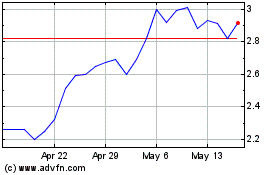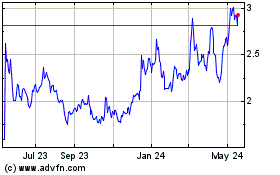Immutep Announces Initial Safety Data from First-in-Human Phase I Trial Evaluating IMP761
18 December 2024 - 12:00AM

Immutep Limited (ASX: IMM; NASDAQ: IMMP) ("Immutep” or “the
Company”), a clinical-stage biotechnology company developing novel
LAG-3 immunotherapies for cancer and autoimmune disease, today
announces favourable initial safety data from the
placebo-controlled, double-blind first-in-human Phase I study
evaluating IMP761. Through the first three of five single ascending
dose cohorts in healthy participants, there have been no treatment
related adverse events.
Dr. Frédéric Triebel, CSO of Immutep, said: “We
are very encouraged by the safety data generated to date for
IMP761, the world’s first LAG-3 agonist antibody, in this Phase I
setting. Derisking this promising asset in this proof-of-concept
study in healthy subjects assessing its safety and
immunosuppressive efficacy on an antigen-specific T-cell mediated
intra-dermal reaction is an important step for this exciting
program in autoimmune diseases. Given that IMP761 is potentially
addressing the root cause of many different autoimmune diseases, we
are eager to see this study generating more data.”
The trial in up to 49 participants is being
conducted by the Centre for Human Drug Research (CHDR) in Leiden,
the Netherlands. In addition to the safety analysis, CHDR is
implementing its keyhole limpet haemocyanin (KLH) challenge model
to evaluate IMP761’s pharmacological activity. Additional safety
data and assessment of pharmacokinetic/pharmacodynamic (PK/PD)
relationships to follow in the first half of CY2025.
The LAG-3 (lymphocyte-activation gene-3) immune
checkpoint has been identified as a promising target for an agonist
antibody to treat rheumatoid arthritis, Type 1 diabetes, and
multiple sclerosis, among potentially many other autoimmune
diseases.1,2,3 This first-in-class agonist LAG-3 antibody is
designed to restore balance to the immune system by enhancing the
“brake” function of LAG-3 to silence dysregulated
self-antigen-specific memory T cells that cause many autoimmune
diseases. In preclinical studies, IMP761 has led to a large
decrease in inflammatory cytokines and demonstrated its
effectiveness in suppressing antigen-specific T cell–mediated
immune responses.4,5
For more information on the trial, please visit
clinicaltrials.gov (NCT06637865).
About IMP761IMP761, a
first-in-class immunosuppressive lymphocyte-activation gene-3
(LAG-3) agonist antibody, has the potential to address the root
cause of many autoimmune diseases by specifically silencing
autoimmune memory T cells that accumulate at disease sites and
restoring balance to the immune system. As published in
the Journal of Immunology, encouraging pre-clinical in
vivo and in vitro studies show IMP761 inhibits
peptide-induced T cell proliferation, activation of human primary T
cells, and an antigen-specific delayed-type hypersensitivity (DTH)
reaction. Additional preclinical data in oligoarticular juvenile
idiopathic arthritis (o-JIA) published in Pediatric
Research details how IMP761 led to a decrease in a broad
spectrum of effector cytokines in just 48 hours. This study also
showed children with o-JIA have a skewed LAG-3 metabolism and
suggested they can benefit from agonistic LAG-3 activity.
About ImmutepImmutep is a
clinical-stage biotechnology company developing novel LAG-3
immunotherapy for cancer and autoimmune disease. We are pioneers in
the understanding and advancement of therapeutics related to
Lymphocyte Activation Gene-3 (LAG-3), and our diversified product
portfolio harnesses its unique ability to stimulate or suppress the
immune response. Immutep is dedicated to leveraging its expertise
to bring innovative treatment options to patients in need and to
maximise value for shareholders. For more information, please visit
www.immutep.com.
1. Pedersen, J.M., Hansen, A.S., Skejø, C. et
al. Lymphocyte activation gene 3 is increased and affects cytokine
production in rheumatoid arthritis. Arthritis Res Ther 25, 97
(2023). https://doi.org/10.1186/s13075-023-03073-z2. Jones BE,
Maerz MD et al. Fewer LAG-3+ T Cells in Relapsing-Remitting
Multiple Sclerosis and Type 1 Diabetes. J Immunol. 2022 Feb
1;208(3):594-602. doi: 10.4049/jimmunol.2100850. Epub 2022 Jan 12.
PMID: 35022272; PMCID: PMC8820445.3. Zhou X, Gu Y et al. From bench
to bedside: targeting lymphocyte activation gene 3 as a therapeutic
strategy for autoimmune diseases. Inflamm Res. 2023
Jun;72(6):1215-1235. doi: 10.1007/s00011-023-01742-y. Epub 2023 Jun
14. PMID: 37314518.4. Mathieu Angin, Chrystelle Brignone, Frédéric
Triebel; A LAG-3–Specific Agonist Antibody for the Treatment of T
Cell–Induced Autoimmune Diseases. J Immunol 15 February 2020; 204
(4): 810–818. https://doi.org/10.4049/jimmunol.19008235. Sag,
E., Demir, S., Aspari, M. et al. Juvenile idiopathic arthritis:
lymphocyte activation gene-3 is a central immune receptor in
children with oligoarticular subtypes. Pediatr Res 90, 744–751
(2021). https://doi.org/10.1038/s41390-021-01588-2
Australian
Investors/Media:Catherine Strong, Sodali & Co+61
(0)406 759 268; catherine.strong@sodali.com
U.S. Media:Chris Basta, VP,
Investor Relations and Corporate Communications+1 (631) 318 4000;
chris.basta@immutep.com
Immutep (NASDAQ:IMMP)
Historical Stock Chart
From Nov 2024 to Dec 2024

Immutep (NASDAQ:IMMP)
Historical Stock Chart
From Dec 2023 to Dec 2024
